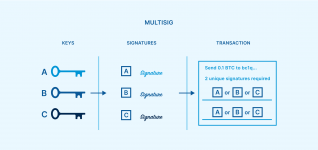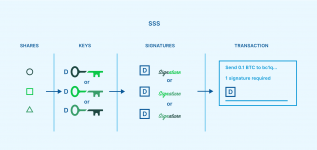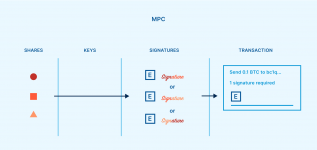This is complete and utter nonsense. All of your "cons" about a debit or ATM card a problem if you are a terrorist, in the mob, or in some doomsday scenario.
Ownership & Custody
I have had a checking account for almost 25 years and the only time I have ever been "restricted" from withdrawing money because of bank polices were instances where I simply had insufficient funds.
You are worried about your bank account being frozen by geopolitical sanctions? Who are you, Vladimir Putin?
Permissionless Access
Again, you are worried about your bank account being flagged? Are you an ISIS or Al Qaeda operative?
Censorship Resistance
The network and banking rules that you are talking about are in place for the specific purpose of keeping honest folks from getting ****** over by dishonest people.
Borderless and Unrestricted
Ok, there are fees - but in my mind they are a small price to pay for the piece of mind of using a regulated and traceable system of transfer. Tied to a specific country might be a problem if you are from Russia or North Korea. Why would an American citizen who banks with a Bank that is part of the regulated American banking system be worried about that?
Self-Sovereignty & Security
If i lose my card, I can have another one in a matter of days. Do you know how rare it is for a person to lose money on uninsured deposits due to bank failure?
Ownership & Custody
You’ve had a stable experience with your bank, which is great. However, your experience doesn’t negate the principle that with traditional banking, you don’t have full ownership of your funds. Banks are custodians of your money, and in extreme cases, they have the legal authority to freeze accounts (e.g., in cases of disputes, errors, or government orders).
Consider situations like:
- Bank bail-ins: In certain jurisdictions (e.g., Cyprus in 2013), depositors had their funds partially seized during financial crises.
- Economic instability: In countries like Venezuela or Lebanon, everyday citizens saw their savings evaporate or accounts frozen due to hyperinflation or government mismanagement.
While these events may seem distant to someone in a stable system like the U.S., bitcoin’s custody model ensures that your money is truly yours in any scenario.
Permissionless Access
You asked, “Who are you, Vladimir Putin or an ISIS operative?” The point isn’t about supporting illicit activities. It’s about recognizing the global significance of financial access. Not everyone enjoys the same privileges as those in stable systems like the U.S.
For example:
- People in sanctioned countries or under authoritarian regimes may find themselves cut off from financial systems through no fault of their own.
- Even in democratic countries, the Canadian truckers’ protests provide a cautionary tale. Protestors—regardless of whether you agree with their cause—were labeled as threats, and their bank accounts were frozen to prevent them from accessing their own money. This demonstrates how quickly financial tools can be weaponized.
The lesson here is that anyone can be labeled a “terrorist” or “threat” to justify restricting access to the banking system, even for peaceful protests or dissent. Bitcoin’s permissionless nature ensures that access to your wealth isn’t contingent on someone else’s judgment or approval.
Censorship Resistance
You mentioned banking rules as a safeguard against dishonest people, which is valid in many cases. However, these rules also have unintended consequences, such as:
- De-platforming without recourse: Payment systems like PayPal or banking institutions sometimes freeze accounts based on algorithmic decisions or false flags. Even if reversed, these errors can cause significant disruptions.
- Charity and activism: In some cases, banks have blocked funds intended for legitimate causes (e.g., aid to conflict zones) because they fall into gray areas of compliance.
Bitcoin is neutral and transparent—it doesn’t judge the morality of transactions. While that can be exploited by bad actors, it also protects legitimate users from censorship and unjust freezes. Again, the Canadian truckers’ example underscores the risks of financial systems being leveraged as tools of control.
Borderless and Unrestricted
You’re right that fees are part of traditional banking, and they’re often small in the U.S. But bitcoin’s borderless nature is transformative for people in the global economy:
- Remittances: Immigrants sending money home often face exorbitant fees and delays with traditional systems (e.g., Western Union or SWIFT). Bitcoin allows instant, low-cost transfers anywhere in the world.
- Cross-border payments: Entrepreneurs working across borders, especially in underbanked regions, often face limitations in accessing global banking networks. Bitcoin levels the playing field.
The average American may not face these challenges directly, but bitcoin’s borderless functionality creates new opportunities for global participation.
Self-Sovereignty & Security
You noted the convenience of getting a new card after losing one, which is true. But consider the principle: Who ultimately controls access to your funds? With bitcoin, you don’t rely on a bank or any intermediary—you control your wealth directly.
Regarding bank failures, while rare in the U.S., they do happen (e.g., Washington Mutual in 2008). FDIC insurance helps, but only up to $250,000, and it takes time for funds to be restored. With bitcoin, there’s no dependence on a third party for access, regardless of system failures or disruptions.





